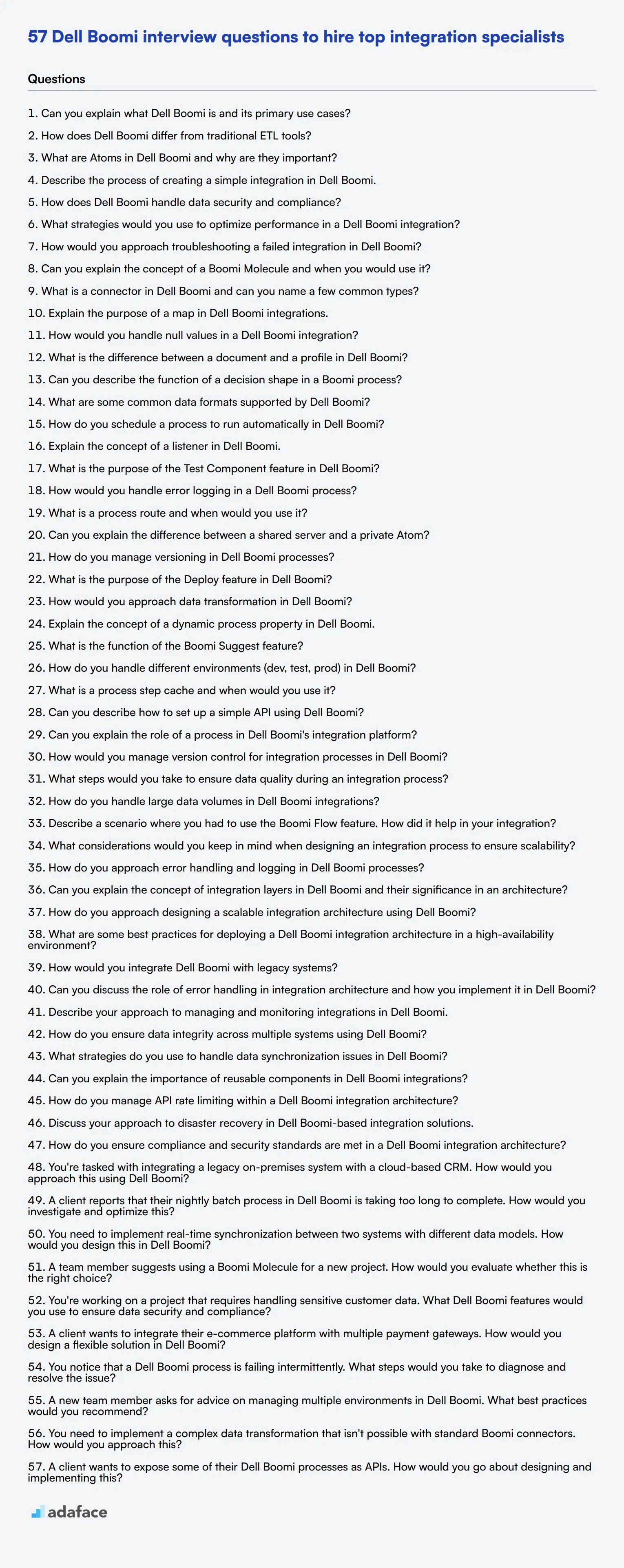Finding the right Dell Boomi integration specialist can be a challenge for recruiters and hiring managers. Asking the right interview questions is crucial to identifying candidates with the necessary skills and experience.
This blog post provides a comprehensive list of Dell Boomi interview questions, covering general knowledge, junior-level queries, integration processes, architecture, and situational scenarios. The questions are designed to help you assess candidates' expertise across various aspects of Dell Boomi integration.
By using these questions, you can effectively evaluate candidates' Dell Boomi proficiency and make informed hiring decisions. Consider complementing your interviews with a Dell Boomi skills assessment to get a well-rounded view of candidates' abilities.
Table of contents
8 general Dell Boomi interview questions and answers to assess candidates
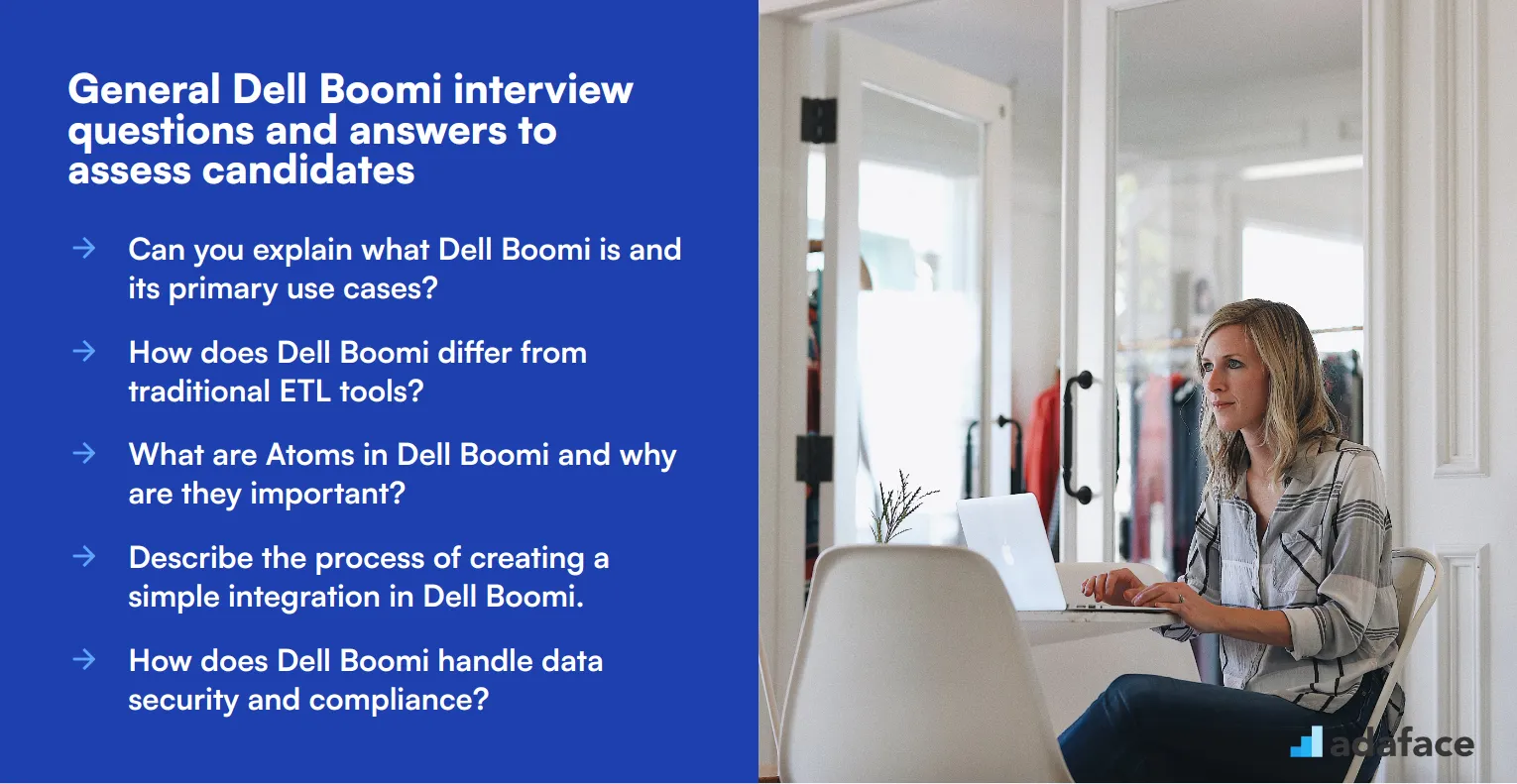
When assessing candidates for Dell Boomi positions, it's crucial to gauge their understanding of integration concepts and Boomi-specific knowledge. These general Dell Boomi interview questions will help you evaluate a candidate's familiarity with the platform and their problem-solving skills. Remember, the best candidates will demonstrate both technical know-how and the ability to apply that knowledge in real-world scenarios.
1. Can you explain what Dell Boomi is and its primary use cases?
Dell Boomi is a cloud-based integration platform as a service (iPaaS) that enables organizations to connect different applications, data, and devices. It's primarily used for:
- Data integration between various systems and applications
- API management and development
- Master data management
- B2B/EDI management
- Workflow automation
Look for candidates who can articulate Boomi's role in simplifying integration processes and its ability to connect cloud and on-premises systems. Strong answers will also mention real-world examples of how Boomi can improve business processes and data flow.
2. How does Dell Boomi differ from traditional ETL tools?
Dell Boomi differs from traditional ETL (Extract, Transform, Load) tools in several key ways:
- Cloud-native architecture: Boomi is designed for cloud environments, offering greater flexibility and scalability.
- Low-code approach: It provides a visual interface for creating integrations, reducing the need for extensive coding.
- Real-time capabilities: Boomi can handle real-time data synchronization, not just batch processing.
- Pre-built connectors: It offers a wide array of connectors for quick integration with popular applications and services.
An ideal candidate should highlight Boomi's ability to handle more complex, real-time integrations across various environments. They might also mention its software engineer friendly features that streamline the development process.
3. What are Atoms in Dell Boomi and why are they important?
Atoms in Dell Boomi are lightweight runtime engines that execute integration processes. They are crucial components of the Boomi architecture for several reasons:
- Flexibility: Atoms can be deployed in various environments (cloud, on-premises, or hybrid).
- Scalability: Multiple Atoms can be clustered for high availability and load balancing.
- Security: Atoms allow data to be processed locally, which is important for sensitive information.
- Offline capabilities: They can continue to operate even if the connection to Boomi AtomSphere is temporarily lost.
A strong answer should emphasize how Atoms contribute to Boomi's adaptability in different integration scenarios. Candidates should also be able to explain how Atoms fit into the overall Boomi architecture and their role in ensuring reliable and secure integrations.
4. Describe the process of creating a simple integration in Dell Boomi.
Creating a simple integration in Dell Boomi typically involves the following steps:
- Define the source and target systems
- Create or select appropriate connectors
- Design the integration flow using Boomi's visual interface
- Configure data mapping between source and target
- Set up any necessary data transformations
- Add error handling and logging
- Test the integration
- Deploy the integration to an Atom or Molecule
Look for candidates who can walk through this process confidently, explaining the purpose of each step. Strong answers will also mention best practices, such as modular design for reusability and the importance of proper error handling. Candidates with hands-on experience might discuss common challenges they've faced during integration development.
5. How does Dell Boomi handle data security and compliance?
Dell Boomi addresses data security and compliance through several key features and practices:
- Encryption: Data in transit and at rest is encrypted using industry-standard protocols.
- Access controls: Role-based access control (RBAC) ensures that only authorized users can access sensitive data and functions.
- Audit trails: Comprehensive logging of all actions for compliance and troubleshooting.
- Certifications: Boomi maintains various security certifications (e.g., SOC 2, ISO 27001).
- Data residency options: Ability to keep data within specific geographic regions for compliance with data sovereignty laws.
An ideal response should demonstrate an understanding of the importance of data security in integration processes. Candidates should be able to explain how Boomi's security features can be leveraged to meet specific compliance requirements, such as GDPR or HIPAA. Look for awareness of cloud engineer responsibilities in maintaining security in cloud-based integrations.
6. What strategies would you use to optimize performance in a Dell Boomi integration?
To optimize performance in a Dell Boomi integration, several strategies can be employed:
- Use of Boomi Suggest for efficient mapping
- Implementing caching mechanisms where appropriate
- Optimizing database queries and connection pooling
- Utilizing parallel processing for large data sets
- Proper error handling and retry mechanisms
- Regular monitoring and tuning of integration processes
- Leveraging Boomi's AtomSphere scaling capabilities
A strong candidate should be able to explain these strategies in detail and provide examples of when and how they've applied them in real-world scenarios. Look for answers that demonstrate an understanding of performance bottlenecks in integration processes and how to identify and address them using Boomi's features and best practices.
7. How would you approach troubleshooting a failed integration in Dell Boomi?
When troubleshooting a failed integration in Dell Boomi, a systematic approach is crucial:
- Review error messages and logs in the Boomi AtomSphere platform
- Check the execution history for the specific process
- Verify connectivity to source and target systems
- Examine data mappings and transformations for potential issues
- Use Boomi's testing and debugging tools to isolate the problem
- Check for any recent changes in the integration or connected systems
- Consult Boomi documentation and community resources if needed
An ideal response should emphasize the importance of a methodical approach to troubleshooting. Look for candidates who mention the use of Boomi's built-in tools for diagnostics and their ability to interpret error messages accurately. Strong answers might also include examples of common integration issues they've encountered and resolved in the past.
8. Can you explain the concept of a Boomi Molecule and when you would use it?
A Boomi Molecule is a clustered runtime environment consisting of multiple Atoms. It's designed to provide high availability and scalability for integration processes. Key aspects of Molecules include:
- Load balancing across multiple Atoms
- Automatic failover for increased reliability
- Shared resources and configurations among Atoms
- Centralized management of the cluster
Candidates should explain that Molecules are typically used in scenarios requiring high throughput, increased availability, or complex integrations spanning multiple systems. Look for answers that demonstrate an understanding of when to choose a Molecule over a single Atom, such as for mission-critical integrations or when dealing with large volumes of data. Strong responses might also touch on the setup and management considerations for Molecules.
20 Dell Boomi interview questions to ask junior integration specialists
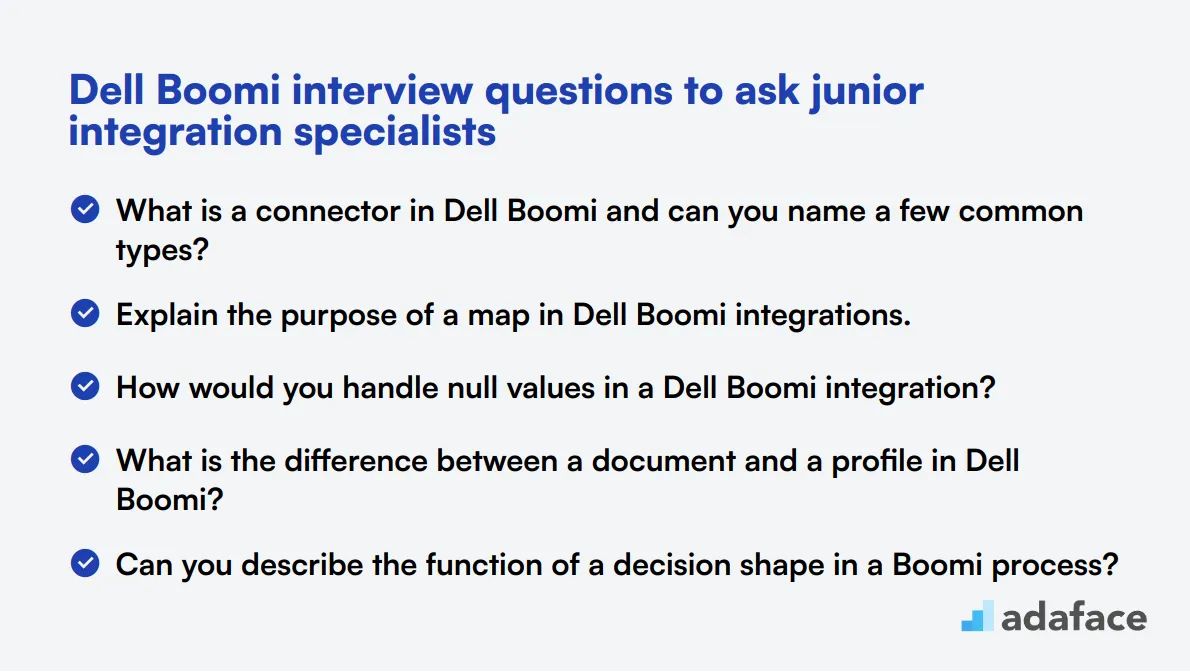
To assess the foundational knowledge and integration skills of junior Dell Boomi specialists, consider using these 20 interview questions. These questions are designed to evaluate a candidate's understanding of basic concepts, common tasks, and problem-solving abilities within the Dell Boomi platform.
- What is a connector in Dell Boomi and can you name a few common types?
- Explain the purpose of a map in Dell Boomi integrations.
- How would you handle null values in a Dell Boomi integration?
- What is the difference between a document and a profile in Dell Boomi?
- Can you describe the function of a decision shape in a Boomi process?
- What are some common data formats supported by Dell Boomi?
- How do you schedule a process to run automatically in Dell Boomi?
- Explain the concept of a listener in Dell Boomi.
- What is the purpose of the Test Component feature in Dell Boomi?
- How would you handle error logging in a Dell Boomi process?
- What is a process route and when would you use it?
- Can you explain the difference between a shared server and a private Atom?
- How do you manage versioning in Dell Boomi processes?
- What is the purpose of the Deploy feature in Dell Boomi?
- How would you approach data transformation in Dell Boomi?
- Explain the concept of a dynamic process property in Dell Boomi.
- What is the function of the Boomi Suggest feature?
- How do you handle different environments (dev, test, prod) in Dell Boomi?
- What is a process step cache and when would you use it?
- Can you describe how to set up a simple API using Dell Boomi?
7 Dell Boomi interview questions and answers related to integration processes
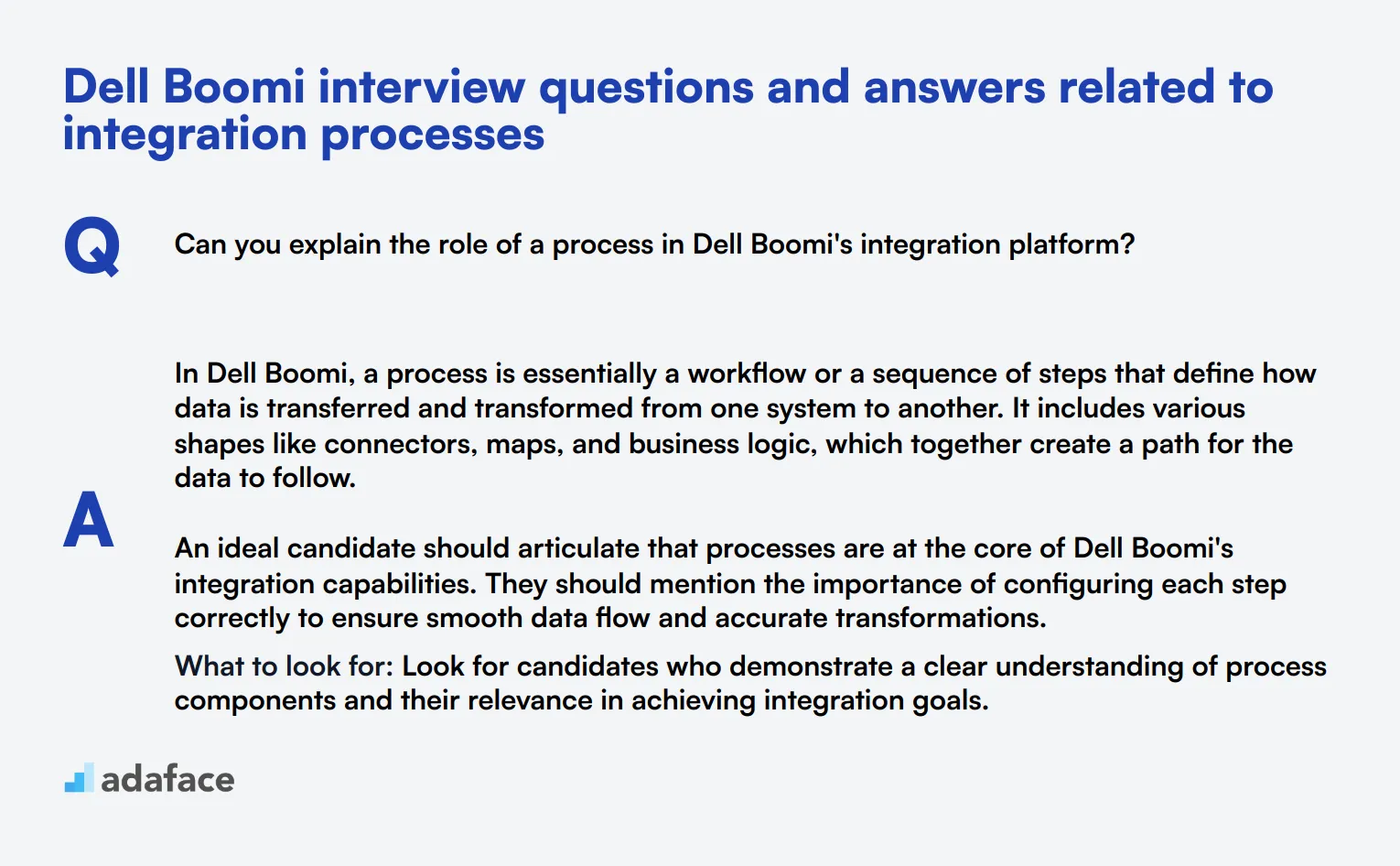
To determine if your candidates have a solid understanding of integration processes in Dell Boomi, consider asking them some of these key interview questions. This collection is designed to help you gauge their practical knowledge and problem-solving skills in real-world scenarios.
1. Can you explain the role of a process in Dell Boomi's integration platform?
In Dell Boomi, a process is essentially a workflow or a sequence of steps that define how data is transferred and transformed from one system to another. It includes various shapes like connectors, maps, and business logic, which together create a path for the data to follow.
An ideal candidate should articulate that processes are at the core of Dell Boomi's integration capabilities. They should mention the importance of configuring each step correctly to ensure smooth data flow and accurate transformations.
What to look for: Look for candidates who demonstrate a clear understanding of process components and their relevance in achieving integration goals.
2. How would you manage version control for integration processes in Dell Boomi?
Managing version control in Dell Boomi involves creating different versions of a process to keep track of changes and updates. This allows you to roll back to previous versions if needed. Boomi provides built-in versioning capabilities where each saved change creates a new version automatically.
Candidates should also mention that maintaining proper documentation and naming conventions helps in managing versions effectively. They should be aware of the versioning policies and how they impact deployment and testing.
What to look for: Candidates should show familiarity with best practices for version control and emphasize the importance of maintaining a clear versioning history.
3. What steps would you take to ensure data quality during an integration process?
To ensure data quality during an integration process, one should implement validation and transformation steps within the process. This can include data cleansing, validation against schemas, and using maps to transform data into the required format.
Additionally, error handling mechanisms should be in place to catch and log any issues that arise during the integration. Regular monitoring and auditing of processes can also help in maintaining data quality.
What to look for: Look for candidates who emphasize proactive measures like data validation and error handling to maintain high data quality throughout the integration.
4. How do you handle large data volumes in Dell Boomi integrations?
Handling large data volumes in Dell Boomi can be managed through chunking or batch processing. By breaking the data into smaller chunks, the process can handle and transfer data efficiently without hitting performance bottlenecks.
Candidates should also mention the use of Boomi's advanced performance settings and optimization techniques such as increasing JVM memory or using parallel processing options.
What to look for: Candidates should demonstrate practical knowledge of handling large datasets and mention specific techniques and settings within Boomi that aid in performance optimization.
5. Describe a scenario where you had to use the Boomi Flow feature. How did it help in your integration?
Boomi Flow is used for building applications that require human interaction, such as workflows involving approvals or input from end-users. In a scenario where data integration also requires user intervention, Boomi Flow can be used to create forms, approvals, and tasks.
For instance, in an order processing system, Boomi Flow can be used to capture order details from a user, which then triggers an integration process to update the backend systems.
What to look for: Look for real-world examples and ensure candidates explain how Boomi Flow integrates with other processes to facilitate workflows requiring human interaction.
6. What considerations would you keep in mind when designing an integration process to ensure scalability?
To ensure scalability in an integration process, it's important to design the process with modularity and reusability in mind. This includes using sub-processes for common tasks and ensuring that each module can be scaled independently.
Moreover, optimizing performance settings and using cloud resources efficiently can help in scaling the process to handle increased loads. Monitoring and adjusting the process based on performance metrics is also crucial.
What to look for: Candidates should highlight key design principles that support scalability and demonstrate awareness of the impact of cloud resources and performance tuning on scalability.
7. How do you approach error handling and logging in Dell Boomi processes?
Error handling in Dell Boomi can be managed using Try-Catch blocks to capture and handle exceptions within a process. Logging can be implemented using connectors to log errors to external systems like databases or log files.
Candidates should also mention the importance of setting up notifications for critical errors and having a robust monitoring system to quickly identify and resolve issues.
What to look for: Look for candidates who have a systematic approach to error handling and logging, and who emphasize the importance of timely notifications and monitoring.
12 Dell Boomi questions related to integration architecture
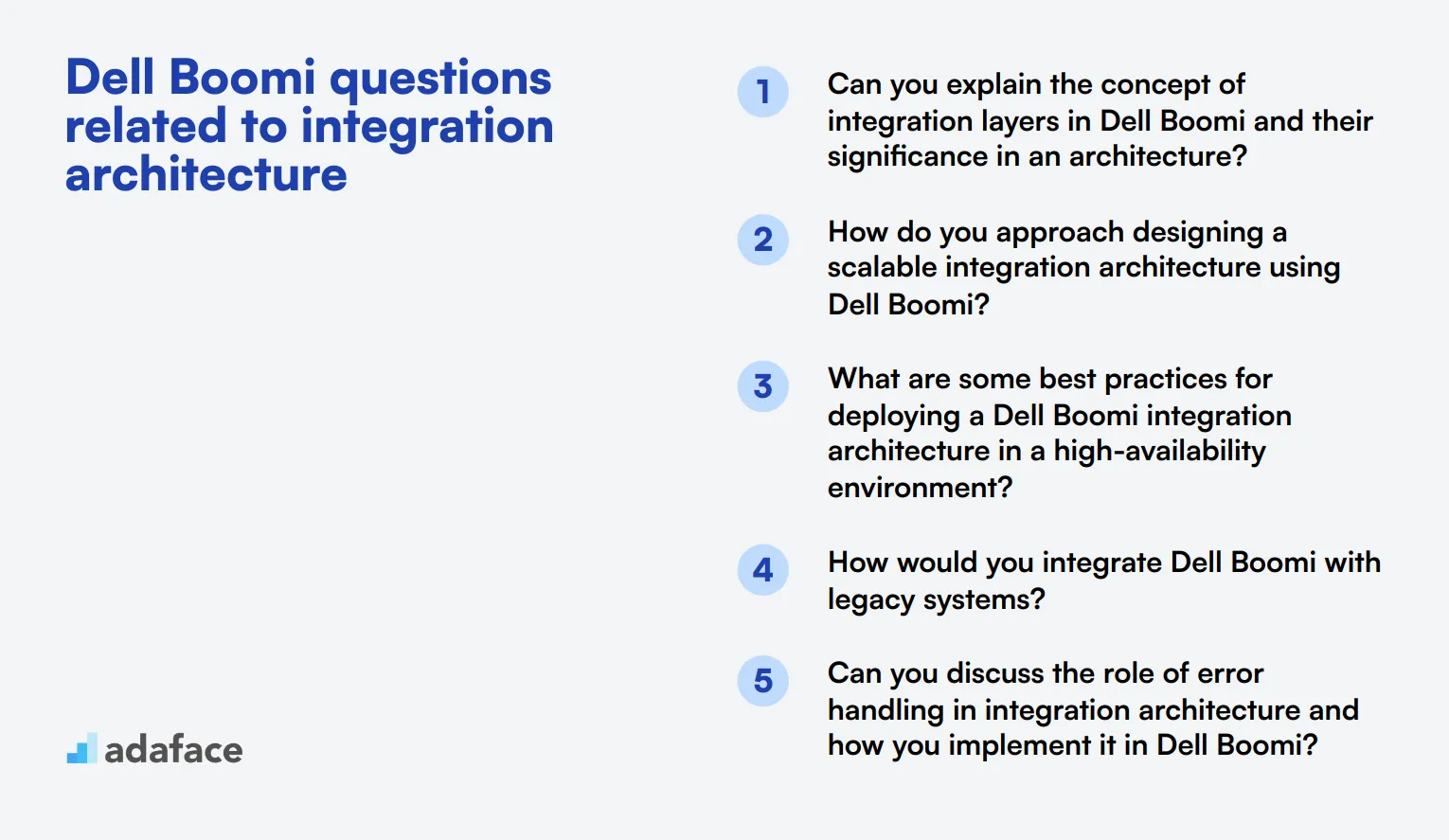
To ensure your candidates can design and manage effective integration architectures using Dell Boomi, use these targeted questions during the interview process. These questions will help you assess the technical proficiency and problem-solving abilities of potential hires, ensuring you find the right fit for your team. For more on effective hiring practices, check out this resource.
- Can you explain the concept of integration layers in Dell Boomi and their significance in an architecture?
- How do you approach designing a scalable integration architecture using Dell Boomi?
- What are some best practices for deploying a Dell Boomi integration architecture in a high-availability environment?
- How would you integrate Dell Boomi with legacy systems?
- Can you discuss the role of error handling in integration architecture and how you implement it in Dell Boomi?
- Describe your approach to managing and monitoring integrations in Dell Boomi.
- How do you ensure data integrity across multiple systems using Dell Boomi?
- What strategies do you use to handle data synchronization issues in Dell Boomi?
- Can you explain the importance of reusable components in Dell Boomi integrations?
- How do you manage API rate limiting within a Dell Boomi integration architecture?
- Discuss your approach to disaster recovery in Dell Boomi-based integration solutions.
- How do you ensure compliance and security standards are met in a Dell Boomi integration architecture?
10 situational Dell Boomi interview questions for hiring top integration specialists
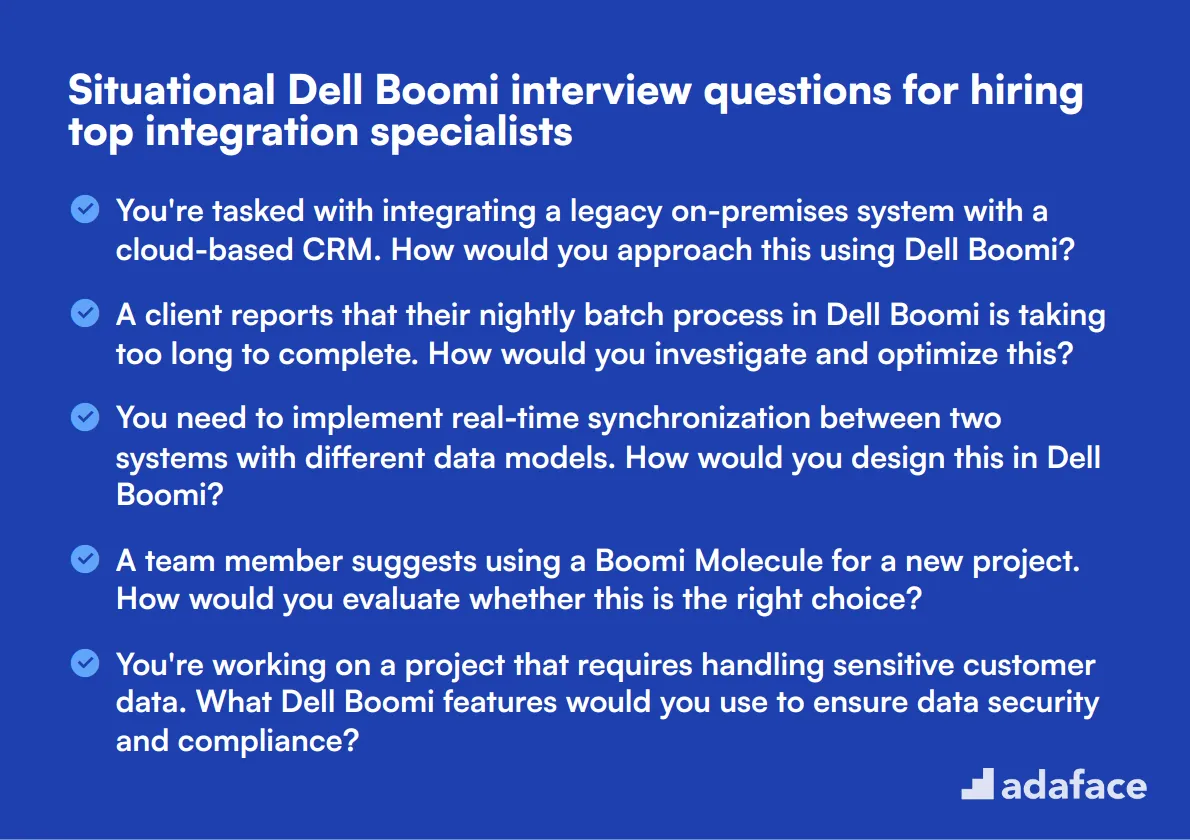
To assess a candidate's ability to handle real-world integration scenarios using Dell Boomi, consider using these situational interview questions. These questions are designed to evaluate how integration specialists apply their knowledge to solve practical challenges and make informed decisions in various integration contexts.
- You're tasked with integrating a legacy on-premises system with a cloud-based CRM. How would you approach this using Dell Boomi?
- A client reports that their nightly batch process in Dell Boomi is taking too long to complete. How would you investigate and optimize this?
- You need to implement real-time synchronization between two systems with different data models. How would you design this in Dell Boomi?
- A team member suggests using a Boomi Molecule for a new project. How would you evaluate whether this is the right choice?
- You're working on a project that requires handling sensitive customer data. What Dell Boomi features would you use to ensure data security and compliance?
- A client wants to integrate their e-commerce platform with multiple payment gateways. How would you design a flexible solution in Dell Boomi?
- You notice that a Dell Boomi process is failing intermittently. What steps would you take to diagnose and resolve the issue?
- A new team member asks for advice on managing multiple environments in Dell Boomi. What best practices would you recommend?
- You need to implement a complex data transformation that isn't possible with standard Boomi connectors. How would you approach this?
- A client wants to expose some of their Dell Boomi processes as APIs. How would you go about designing and implementing this?
Which Dell Boomi skills should you evaluate during the interview phase?
Assessing a candidate's capabilities in a single interview can be challenging. However, focusing on specific Dell Boomi skills allows interviewers to evaluate candidates effectively. Here are the core skills you should be looking for during the interview phase.
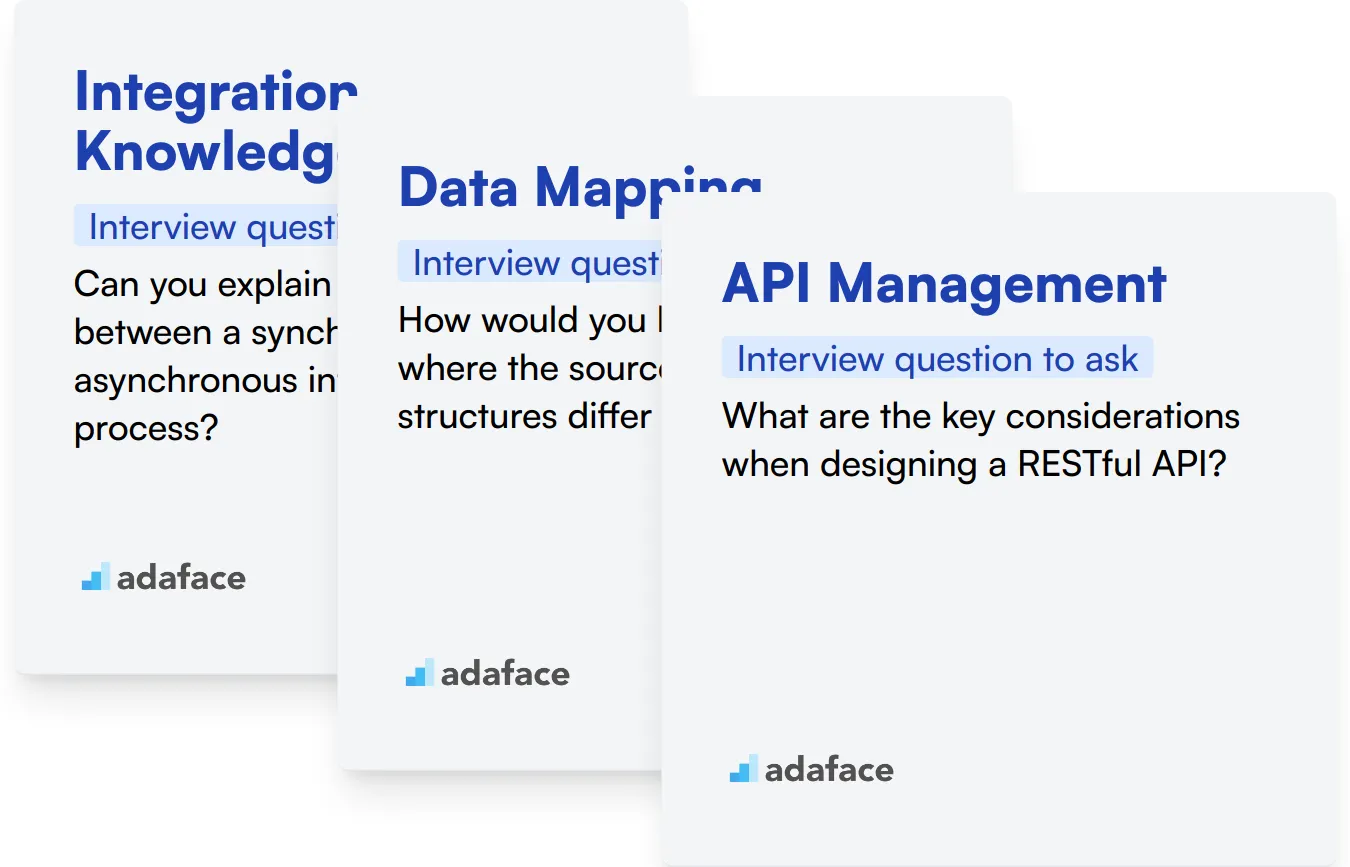
Integration Knowledge
To filter out candidates based on integration knowledge, consider using an assessment test that includes relevant multiple-choice questions. You can explore our Dell Boomi online test to evaluate this skill effectively.
You can also ask targeted interview questions to gauge their understanding of integration concepts. Here's one to consider:
Can you explain the difference between a synchronous and asynchronous integration process?
When asking this question, look for a clear differentiation between the two types of processes. Candidates should be able to articulate how synchronous processes require immediate feedback while asynchronous processes allow for delayed responses, demonstrating their grasp of integration fundamentals.
Data Mapping
To assess data mapping skills, you may want to include relevant multiple-choice questions in your testing process. Consider utilizing appropriate assessments to filter candidates effectively.
A targeted question could further clarify their data mapping expertise:
How would you handle a situation where the source and target data structures differ significantly?
When evaluating responses, watch for candidates who propose practical strategies for alignment, such as using transformation functions or creating custom mappings, showing their capability to tackle real-world challenges.
API Management
To evaluate API management skills, consider administering an assessment with multiple-choice questions tailored to this topic. Relevant tests can help pinpoint candidates with solid API knowledge.
You might also consider asking this question to assess their API management experience:
What are the key considerations when designing a RESTful API?
Look for candidates to mention aspects such as endpoint design, statelessness, and proper use of HTTP methods, indicating their comprehensive understanding of API best practices.
3 Tips for Effectively Using Dell Boomi Interview Questions
Before you put your newfound knowledge into action, here are a few tips to consider for maximizing the effectiveness of your Dell Boomi interview questions.
1. Utilize Skill Assessments Pre-Interview
Using skill tests before interviews can significantly improve the candidate selection process. These assessments help identify candidates who possess the necessary skills and knowledge for the position, ensuring a more efficient interview process.
For example, you could use the Dell Boomi online test to evaluate candidates' integration knowledge before bringing them in for an interview. The insights gained from these tests enable you to focus on candidates who demonstrate competency in key areas.
Implementing skill tests not only streamlines your interview process but also enhances the quality of hires by ensuring candidates are well-matched for the role. This sets the stage for the next tip about curating your interview questions.
2. Curate Targeted Interview Questions
When it comes to conducting effective interviews, time is often limited. Selecting a focused set of relevant questions is crucial for accurately assessing candidates on important skills and sub-skills.
Consider including questions that explore candidates' problem-solving abilities, technical knowledge, and soft skills like communication and teamwork. For instance, you can also refer to our other interview questions for related areas such as data science or cloud computing.
By narrowing your question set, you can effectively evaluate candidates without overwhelming them or missing out on critical areas of assessment.
3. Incorporate Follow-Up Questions
Simply asking interview questions isn't sufficient; it's important to include follow-up questions to gain deeper insights into the candidate's responses. This approach helps clarify any ambiguous answers and ensures candidates aren't just providing surface-level information.
For example, if a candidate states they have experience with Dell Boomi integrations, a good follow-up question could be, 'Can you describe a specific integration project you worked on and the challenges you faced?' This follow-up probes deeper, allowing you to assess their hands-on experience and problem-solving capabilities.
Use Dell Boomi interview questions and skills tests to hire talented integration specialists
If you are looking to hire someone with Dell Boomi skills, it's crucial to ensure they possess these skills accurately. The best way to do this is by using skill tests like our Dell Boomi Online Test or relevant tests such as the Cloud Computing Online Test.
Once you've used these tests, you can shortlist the best applicants and call them for interviews. To proceed, you can sign up on our dashboard or explore our test library for more options.
Dell Boomi Online Test
Download Dell Boomi interview questions template in multiple formats
Dell Boomi Interview Questions FAQs
Dell Boomi is a cloud-based integration platform that allows businesses to connect various applications and data sources seamlessly.
Dell Boomi facilitates easy integration of cloud and on-premises applications, ensuring smooth data flow and operational efficiency.
A Dell Boomi specialist should have skills in integration processes, understanding of integration architecture, and experience with various connectors and APIs.
You can assess this by asking technical questions related to integration processes, architectural patterns, and situational scenarios involving Dell Boomi.
Yes, Dell Boomi's scalability makes it suitable for businesses of all sizes, including small and medium enterprises.
Common use cases include application integration, data management, API management, and workflow automation.

40 min skill tests.
No trick questions.
Accurate shortlisting.
We make it easy for you to find the best candidates in your pipeline with a 40 min skills test.
Try for freeRelated posts
Free resources




